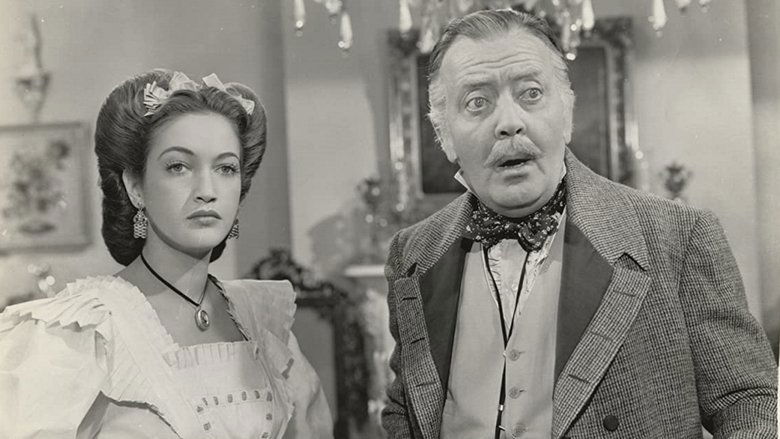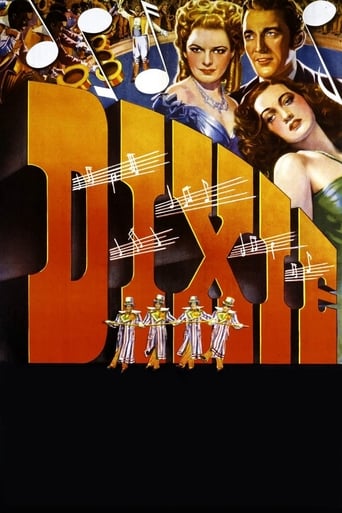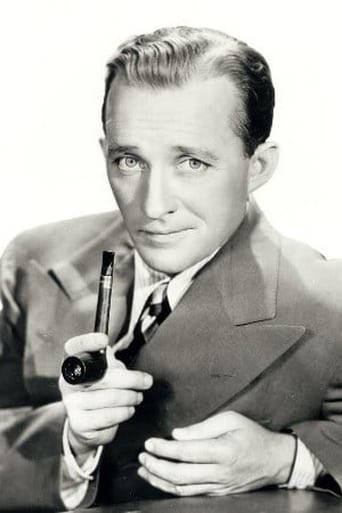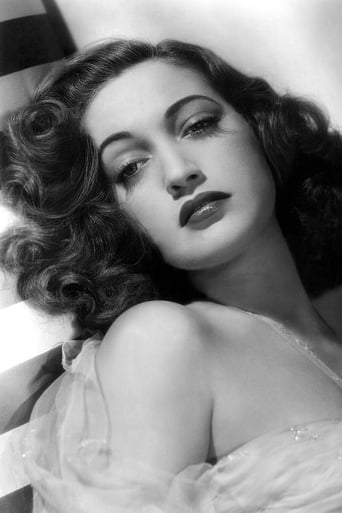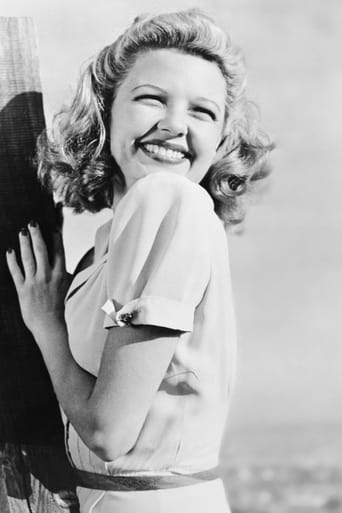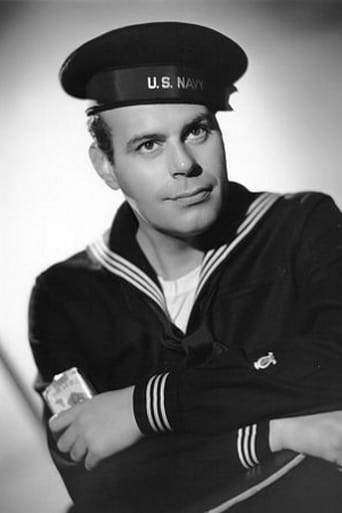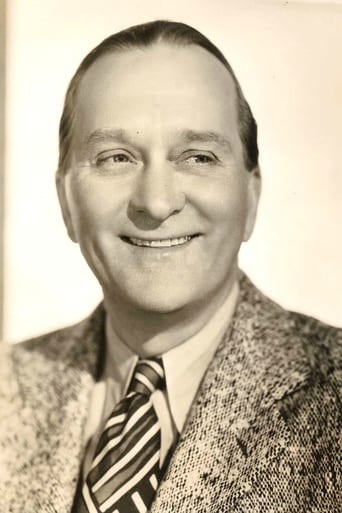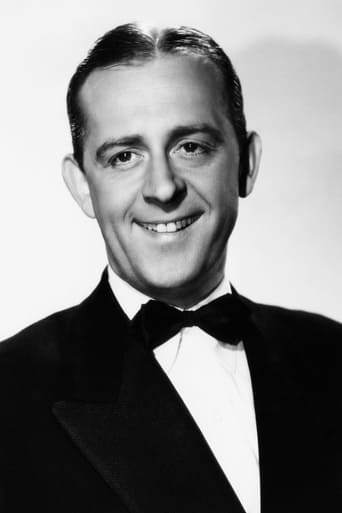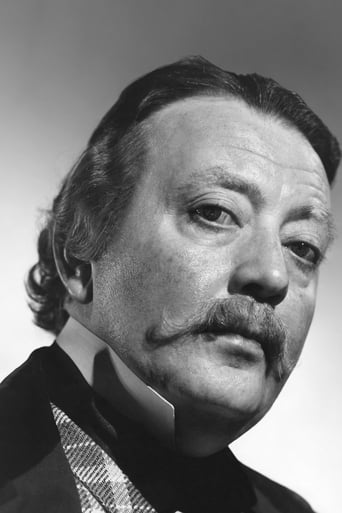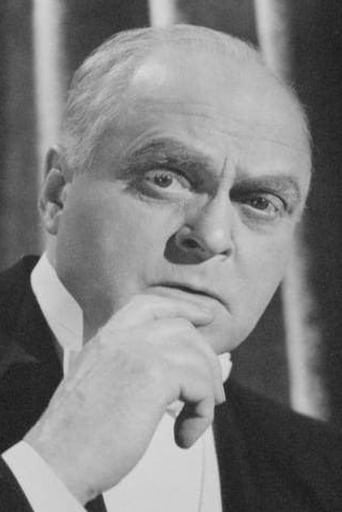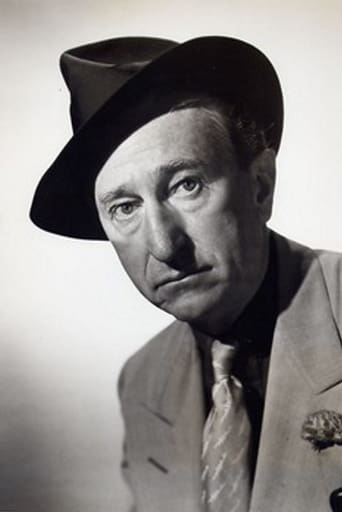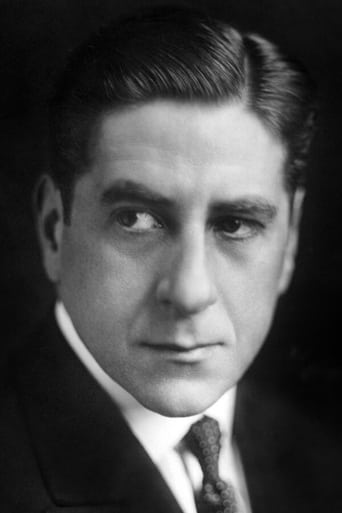A young songwriter leaves his Kentucky home to try to make it in New Orleans. Eventually he winds up in New York, where he sells his songs to a music publisher, but refuses to sell his most treasured composition: "Dixie." The film is based on the life of Daniel Decatur Emmett, who wrote the classic song "Dixie."
Similar titles


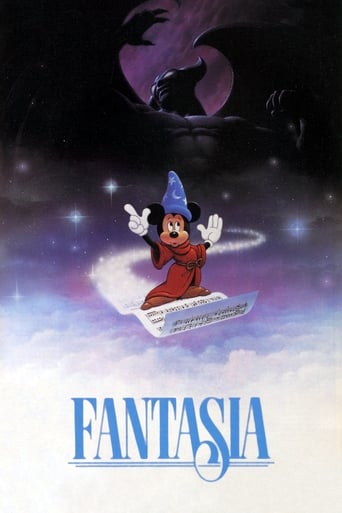
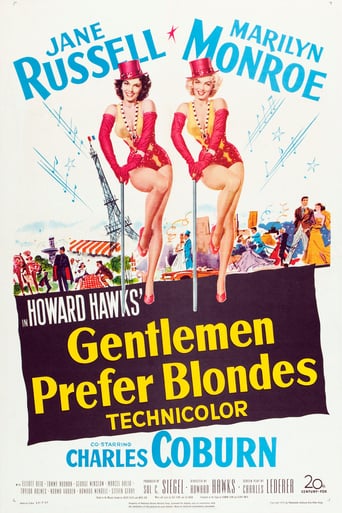


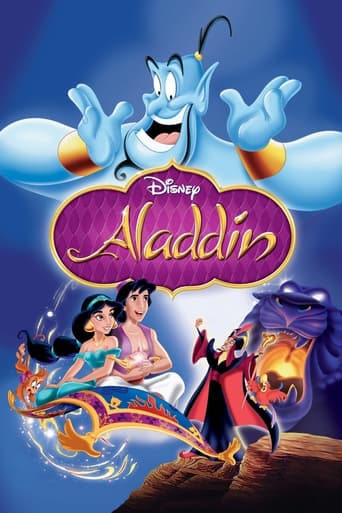


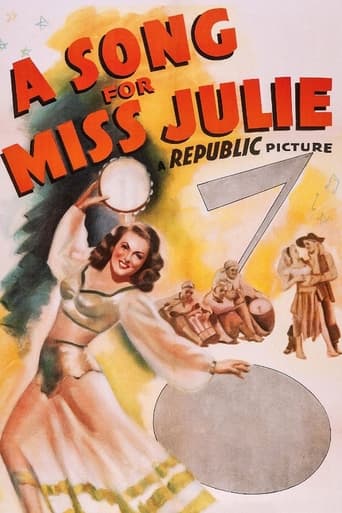
Reviews
People are voting emotionally.
Did you people see the same film I saw?
The best films of this genre always show a path and provide a takeaway for being a better person.
This is a coming of age storyline that you've seen in one form or another for decades. It takes a truly unique voice to make yet another one worth watching.
My title is partially derived from one of the TV episodes of "Julia": a parody of Bing Crosby's hit song from "Holiday Inn", released the year before this film.....It is indeed ironic that "Dixie", as well as most of the other songs that have come to be associated with the antebellum South, were composed by two staunch Yankees: Dan Emmett and Stephan Foster, and mostly for Yankee minstrel shows. Unlike the story in this film, I could find no info that Emmett ever traveled into the South, and Foster made only one trip into the South, by steamboat to New Orleans, rather reminiscent of the scene early in this film when Crosby and a chorus of African Americans sing "Swing Low Sweet Chariot". This scene also reminds us of some of the scenes in Jerome Kerns' "Showboat". Emmett is also credited with being the inspiration behind the first full-fledged blackface minstrel show, in 1843. As in this film, this consisted of 4 men. However, in the film , the silly excuse for using blackface is to cover up their blackeyes from a brawl. Blackface routines had been around in the US since early colonial days, and in medieval Europe. Emmett was primarily a singer and instrument player, and had used blackface in his routines in circuses before this time. In the long interval between '43 and '58, he did not perform in minstrel shows, serving as a musician in various other capacities. Emmett composed "Dixie" in 1859, while a member of a NYC minstrel group. Initially a hit in the North, it was modified into a band piece and war song for the South, with many different lyrics. As in the finale, a performance in New Olreans did spark its popularity in the South. Unlike in the film, where he refuses to sell the copyright for $1., he sold it for $500. to a NYC firm. The fictitious bit in the film where Emmett is given $500.by his prospective father-in-law is perhaps derived from this bit of history.Although this is supposed to be a biographical treatment of Emmett, nearly all the details are totally fictitious, and nearly all the other songs were either new creations for this film, or 19th century songs composed by others! He had two wives, but they certainly weren't southern belles, as portrayed, one being from NYC and the other from Chicago, and they weren't competitors. The plot construction is a switcheroo romantic quadrangle: a very common plot formula in musicals of this era. If we substitute Fred Astaire for Billy De Wolfe and Vrginia Dale for Dorothy Lamour, we have essentially the same romantic melodrama as in "Holiday Inn" of the previous year. In both films, Crosby and Marjorie Reynolds end up a romantic couple in the finale. Dorothy is portrayed as a shameless hussy of a southern belle, whereas Marjorie is portrayed as true to Emmett, but offering to step aside for Dorothy when she discovers that Emmett planned to ditch her for Dorothy until he discovered that she had become partially paralyzed from polio, She surmised that he married her only out of pity. Incidentally,paralytic polio was a rather common and much feared disease when this film was made, exemplified by President Roosevelt. But, back in mid-19th century, it was a minor disease, and mostly of infants and young children, very rarely adults.This was the film debut for comedic character actor Billy De Wolfe, and he almost steals the show in the middle half, before mostly disappearing in the last portion.He essentially takes the place of Bob Hope, Fred Astaire, Martha Raye or Betty Hutton in Crosby's films of this era. He would help to enliven "Blue Skies": the second and less entertaining pairing of Crosby and Astaire.The film fails to convey the fact that his character's name: Mr. Bones, was a stock character in minstrels, originating from the use of 2 bones as a crude castanet. Mr. Bones was also one of the main characters in the extensive minstrel show in "Babes on Broadway".The 3 building fires served as a running gag, each supposedly started by Bing forgetting his lit pipe. Must have had some gasoline-soaked tobacco in that pipe! The first 2 fires served to end one phase of the film, while the last serves as an excuse to speed the tempo of "Dixie", and to destroy Marjorie's now unwanted letter of proposed divorce.This film is notable for the large amount of blackface entertainment. I have no problem with that. To me, it's no different from other forms of stage, film and circus clowning around, including all those 'white face' circus clowns. Historically, AAs often participated in such minstrel shows post Civil War. The NAACP is far too uptight about any public entertainment that portrays AAs in the stock negative characterizations of minstrel shows, early films, and the 'Amos and Andy' TV show, which was one of my favorite shows as a kid. Unfortunately, TV executives overreacted to criticism of the characterizations in this show and cancelled all shows dominated by AAs, including Nat Cole's show.Finally, in the late '60s, "Julia" was tried. It was the first sitcom to present AAs as legitimate middle class Americans, but was criticized for presenting an atypical AA characterization. The characters were said to be essentially 'whites with black faces' and Ms. Carroll was a light-skinned AA, thus a compromise AA.See this film on You Tube, in 9 segments. Rating: 2 for historical accuracy, 7 for entertainment value.
DixieThroughout history there has been hardships for African Americans. Slavery, obtaining human rights, and discrimination are examples of the hard times that African Americans have gone through. Many movies that were made around the 1940's can be offensive to many African Americans because these hardships such as slavery and discrimination are portrayed within them. Within the comical musical Dixie directed by A Edward Sutherland, 1943, it lets its viewers see and recognize what the time period was really like. Although the movie was well directed, written and acted out, the truth of the time period shines through. Although this film was not made to be offensive, it is. Slavery and discrimination are shown through the song "Dixie," and by characters within the movie. When Daniel Emmett went and performed with his, at first three partners, they used makeup to paint their faces black and over exaggerate the size of their lips. They talked as if they were uneducated and didn't understand things. Also characters from the audience at first were insulted and appalled that "darkies" were performing on stage. This attitude is not make- believe. This was the reaction of people during this time period to African Americans. During this time period Minstrel entertainment was popular during the 19th century. White performers would mimic African Americans as a main attraction by coloring their faces and using makeup to make it look like they have big lips and eyes. Later African Americans did participate in there own form of festivities called the Pinkster celebrations in which black and white performers would gather and celebrate the change of the season. This would ultimately change into a primarily African American holiday that slaves and free blacks would catch up with family and friends. This gave them a chance to express and pass on their traditions and cultures. Dixie portrays the discrimination and slavery that was still going on during this time period. The racism of the audience and reference to slavery within the song "Dixie" all show how this can be offensive to a wide majority of viewers. Although these are within the film, overall the film does a good job at showing what the time period was like and had a good story.
After viewing the 1943 classic Dixie, it was apparent that at this civil war time entertainment there were different styles of dance emerging. During this time it became a popular diversion to spend evenings at a minstrel theatre. Straying away from the traditional opera or ballet, minstrels offered a new sense of entertainment which promoted the class system. Fortunately our society today is accepting African American's and prejudices are less prevalent. Subsequent to professional minstrelsy's decline in the 20th century, its appeal continued in the south. Though minstrels proposed stereotypes, some good did result from this type of entertainment. These shows presented black performers the opportunity to build a foundation which later helped many of them to emerge as successful entertainers.Minstrel shows exposed a wide selection of audiences to this unique type of entertainment. With its combination of eccentric dancing and diverse music, people enjoyed the allure of the entertainment. Closely similar to tap dancing, it boasted innovative and bizarre movements' pairs with flamboyant eye-catching costumes.This type of amusement contributed to later types of dancing and entertainment. As a big benchmark in the industry, without minstrels played a role in what dancing has evolved into presently. Without minstrels, who knows if the great such as Dizzy Gillespie, W.C. Handy, and Bert Williams, would have been as successful as they were.
DIXIE (Paramount, 1943), directed by A. Edward Sutherland, capitalizes on the then current trend of musical biographies of popular songwriters of the twentieth century, a cycle that appeared to have begun with the life of George M. Cohan in YANKEE DOODLE DANDY (WB, 1942). Unlike this and others made during this period, DIXIE goes back a century, prior to the Civil War in fact, depicting the life of a composer named Daniel Decatur Emmett. His life-story is as unknown as his name itself. The fictional screenplay does toy with the facts before leading to the purpose of its film title, the composition that's to become Emmett's most recognizable American song of all, "Dixie." Bing Crosby, one of Hollywood's top box office attractions, is properly cast as Dan Emmett. It reunites him with HOLIDAY INN (1942) co-star, Marjorie Reynolds, and re-teams him opposite Dorothy Lamour, in her only film opposite Crosby outside from the seven "Road to" comedies all featuring Bob Hope as part of the funny trio.Dan Emmett's life is portrayed more to the personification of Çrosby himself, that of a good-natured singer/composer whose only weakness is his forgetfulness, especially when it comes to leaving his lit up smoking pipe around that causes a fire. He is engaged to Jean Mason (Marjorie Reynolds), a beautiful blonde Southern belle whose father (Grant Mitchell) disapproves of their courtship because he feels Dan to be irresponsible and won't amount to anything. Mason's more convinced now after Dan's lit-up pipe has caused the burning and destruction of Mason's old Kentucky home. However, Mason consents to Jean's marriage only if Dan can prove himself capable by doubling his $500 life savings to $1,000 within six months. (A similar opening lifted from the more familiar Fred Astaire musical, SWING TIME, in 1936). Leaving his clerical job, Dan seeks his fortune in New Orleans. While riverboat bound, he loses all of his $500 to Mr. Bones (Billy De Wolfe), a suave actor and cardsharp. After discovering that he had been cheated, he sets out to find Mr. Bones. Instead of beating him for the return of his money, composer and actor form a partnership leading to the origins of what was to be known as a Minstrel Show. Dan, who has already encountered Millie Cook (Dorothy Lamour) at the boarding house to whom Bones and other out-of work actors (Lynne Overman and Eddie Foy Jr.) owe back rent for their lodgings to her trusting father (Raymond Walburn), finds himself in love with her, in spite that she's the aggressor who made the first move. Dan decides to return to Kentucky and break his engagement to Jean. Upon his return, Dan finds the girl he once loved to be a victim of a crippling disease, polio, that puts him in a difficult situation as to which girl he should marry, and which should get his swan song.Oddly enough for a life-story about a composer, one would expect a handful of selections by Emmett himself, however, with the exception of "Old Dan Tucker," and "Dixie," many were by others, new ones by James Van Heusen and Johnny Burke. The motion picture soundtrack includes "Sunday, Monday or Always," "Swing Low, Sweet Chariot," (both sing by Bing Crosby); "Kinda Peculiar Brown" (sung/performed by Eddie Foy Jr. and Lynne Overman); "Old Dan Tucker," "The Last Rose of Summer," "She's From Missouri," "Let the Minstrel Show You How," "Kinda Peculiar Brown" (dance number); "The Horse That Knew the Way Back Home," "If You Please," "Sunday, Monday or Always," and "Dixie." While "Dixie" is the song in question, "Sunday, Monday or Always" is the film's most romantic ballad, and one of many most associated with Crosby. The Lynne Overman and Eddie Foy Jr. number early in the story is another highlight.So is it true, as depicted on screen, that the birth of the minstrel show was due to white actors acquiring black eyes in a fight to cover up their bruises by darkening themselves up with cork? Hard to tell since minstrel shows have become part of American culture that remains to be a controversial issue. How much is true about the Mr. Bones character as portrayed by Billy DeWolfe (in his screen debut) is another issue. His amusing scenes, however, come off quite well, at best when cheating at cards, and, in a sense, tasteless, when obtaining a free meal in a restaurant by placing a cockroach in his food before being nearly finished, then complaining the "incident" to a waiter. The result to this colorful production finds Crosby satisfying, as always; Reynolds quite sympathetic; DeWolfe, Overman and Foy comical delights; with Lamour leaving a lasting impression long after the finish of the film as she joins in with other proud southerners singing to Emmett's immortal song of the south, "I wish I was in Dixie, hooray, hooray!!!" in full camera closeup.Less dramatic than composer Stephen Foster's interpretation in SWANEE RIVER (1939), each film has benefited from its lavish Technicolor. During the sequence depicting Emmett's Virginia Minstrels as the troupe performs in an opera house to a sophisticated audience, where the song, "Dixie," is to be introduced, a patron (Norma Varden) observing the show quips about the show to be of "such poor taste." Due to extensive use of minstrel show numbers recapturing that bygone era from which this film is based, is the sole reason why DIXIE hasn't aired on television since the 1980s. A video copy, however, was obtained by a private collector from which this review is based. How DIXIE succeeds or fails if seen today depends on the individual viewer. (***)
Top Streaming Movies











